Comprehensive Report: International Business Negotiation Strategies
VerifiedAdded on 2020/01/28
|10
|2862
|228
Report
AI Summary
This report delves into the multifaceted world of international business negotiation, emphasizing its multidisciplinary nature and significance across various contexts. It examines the core principles of negotiation, including the importance of arriving at mutually beneficial outcomes and resolving conflicts effectively. The report explores negotiation theories such as decision analysis and game theory, highlighting their roles in strategic decision-making. It details the stages of negotiation, from preparation to implementation, and identifies essential skills for negotiators, including problem analysis, active listening, and effective communication. The report also addresses the impact of cultural aspects on negotiation strategies, communication styles, and time management, emphasizing the need for adaptability in international business dealings. Finally, it explores different negotiation types, such as deal-making and dispute resolution, and illustrates the widespread application of negotiation in both professional and personal spheres. This report provides a comprehensive overview of international business negotiation, offering valuable insights for students and professionals alike.

International Business Negotiations
Paraphrase This Document
Need a fresh take? Get an instant paraphrase of this document with our AI Paraphraser

Table of Contents
INTRODUCTION...........................................................................................................................3
MAIN BODY..................................................................................................................................3
CONCLUSION................................................................................................................................7
REFERENCES................................................................................................................................8
INTRODUCTION...........................................................................................................................3
MAIN BODY..................................................................................................................................3
CONCLUSION................................................................................................................................7
REFERENCES................................................................................................................................8
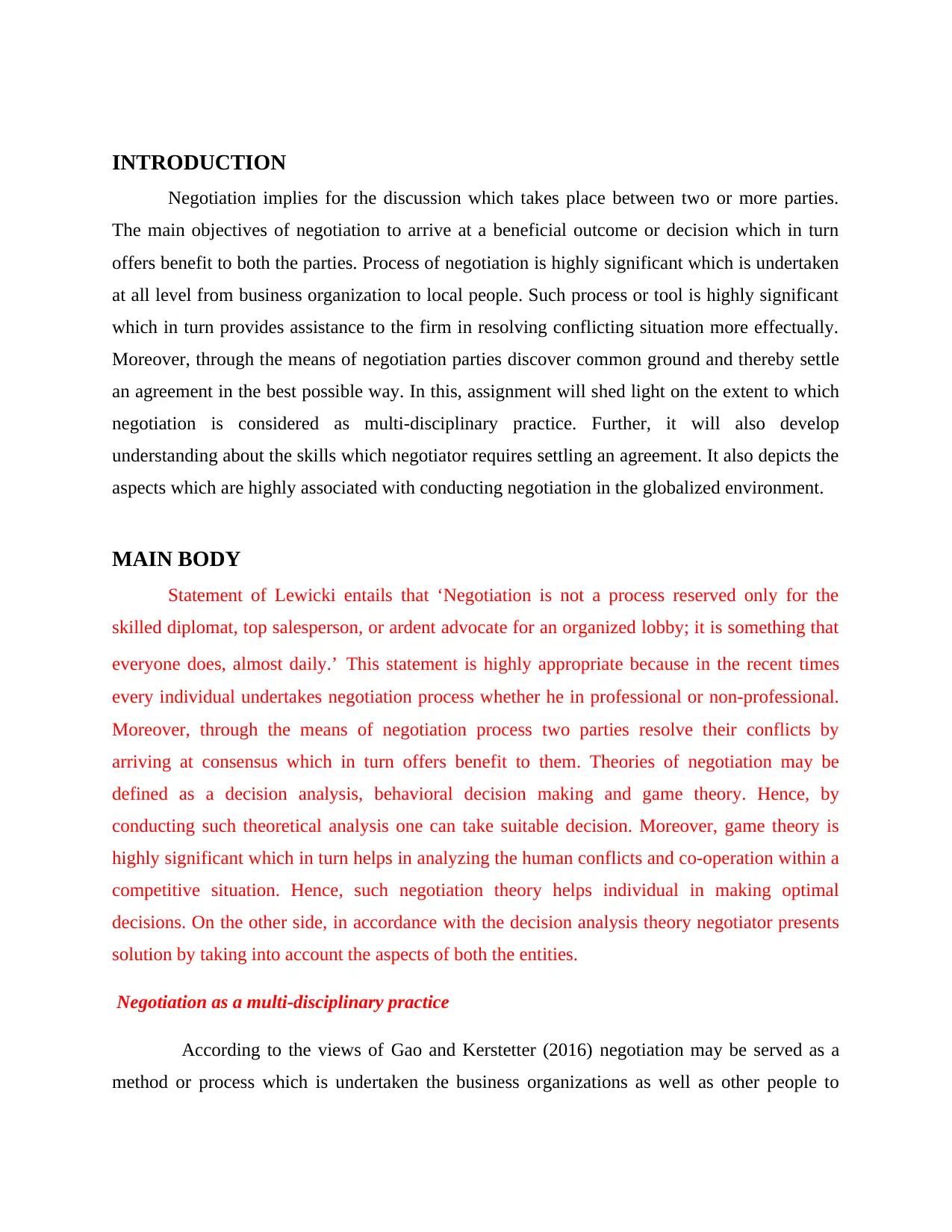
INTRODUCTION
Negotiation implies for the discussion which takes place between two or more parties.
The main objectives of negotiation to arrive at a beneficial outcome or decision which in turn
offers benefit to both the parties. Process of negotiation is highly significant which is undertaken
at all level from business organization to local people. Such process or tool is highly significant
which in turn provides assistance to the firm in resolving conflicting situation more effectually.
Moreover, through the means of negotiation parties discover common ground and thereby settle
an agreement in the best possible way. In this, assignment will shed light on the extent to which
negotiation is considered as multi-disciplinary practice. Further, it will also develop
understanding about the skills which negotiator requires settling an agreement. It also depicts the
aspects which are highly associated with conducting negotiation in the globalized environment.
MAIN BODY
Statement of Lewicki entails that ‘Negotiation is not a process reserved only for the
skilled diplomat, top salesperson, or ardent advocate for an organized lobby; it is something that
everyone does, almost daily.’ This statement is highly appropriate because in the recent times
every individual undertakes negotiation process whether he in professional or non-professional.
Moreover, through the means of negotiation process two parties resolve their conflicts by
arriving at consensus which in turn offers benefit to them. Theories of negotiation may be
defined as a decision analysis, behavioral decision making and game theory. Hence, by
conducting such theoretical analysis one can take suitable decision. Moreover, game theory is
highly significant which in turn helps in analyzing the human conflicts and co-operation within a
competitive situation. Hence, such negotiation theory helps individual in making optimal
decisions. On the other side, in accordance with the decision analysis theory negotiator presents
solution by taking into account the aspects of both the entities.
Negotiation as a multi-disciplinary practice
According to the views of Gao and Kerstetter (2016) negotiation may be served as a
method or process which is undertaken the business organizations as well as other people to
Negotiation implies for the discussion which takes place between two or more parties.
The main objectives of negotiation to arrive at a beneficial outcome or decision which in turn
offers benefit to both the parties. Process of negotiation is highly significant which is undertaken
at all level from business organization to local people. Such process or tool is highly significant
which in turn provides assistance to the firm in resolving conflicting situation more effectually.
Moreover, through the means of negotiation parties discover common ground and thereby settle
an agreement in the best possible way. In this, assignment will shed light on the extent to which
negotiation is considered as multi-disciplinary practice. Further, it will also develop
understanding about the skills which negotiator requires settling an agreement. It also depicts the
aspects which are highly associated with conducting negotiation in the globalized environment.
MAIN BODY
Statement of Lewicki entails that ‘Negotiation is not a process reserved only for the
skilled diplomat, top salesperson, or ardent advocate for an organized lobby; it is something that
everyone does, almost daily.’ This statement is highly appropriate because in the recent times
every individual undertakes negotiation process whether he in professional or non-professional.
Moreover, through the means of negotiation process two parties resolve their conflicts by
arriving at consensus which in turn offers benefit to them. Theories of negotiation may be
defined as a decision analysis, behavioral decision making and game theory. Hence, by
conducting such theoretical analysis one can take suitable decision. Moreover, game theory is
highly significant which in turn helps in analyzing the human conflicts and co-operation within a
competitive situation. Hence, such negotiation theory helps individual in making optimal
decisions. On the other side, in accordance with the decision analysis theory negotiator presents
solution by taking into account the aspects of both the entities.
Negotiation as a multi-disciplinary practice
According to the views of Gao and Kerstetter (2016) negotiation may be served as a
method or process which is undertaken the business organizations as well as other people to
⊘ This is a preview!⊘
Do you want full access?
Subscribe today to unlock all pages.

Trusted by 1+ million students worldwide
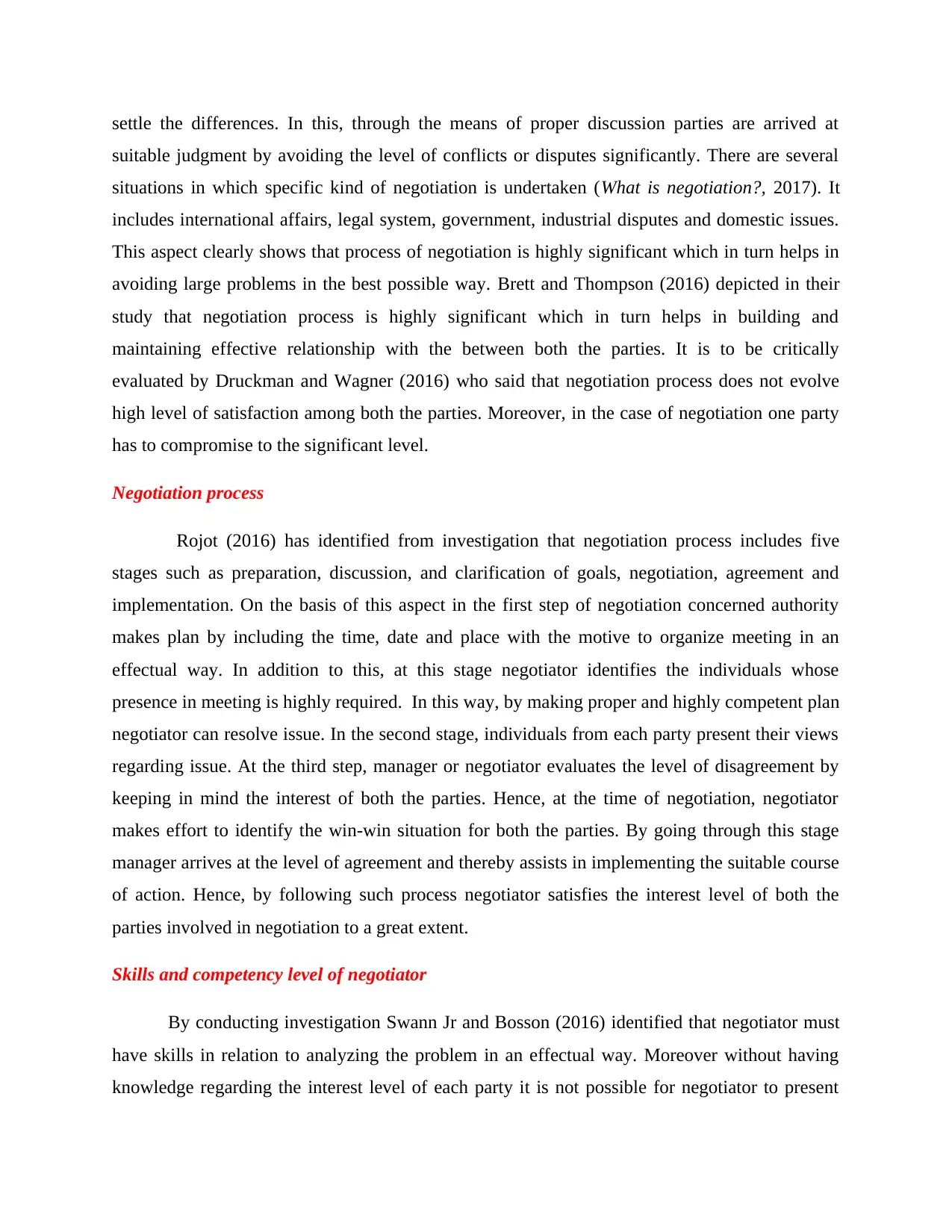
settle the differences. In this, through the means of proper discussion parties are arrived at
suitable judgment by avoiding the level of conflicts or disputes significantly. There are several
situations in which specific kind of negotiation is undertaken (What is negotiation?, 2017). It
includes international affairs, legal system, government, industrial disputes and domestic issues.
This aspect clearly shows that process of negotiation is highly significant which in turn helps in
avoiding large problems in the best possible way. Brett and Thompson (2016) depicted in their
study that negotiation process is highly significant which in turn helps in building and
maintaining effective relationship with the between both the parties. It is to be critically
evaluated by Druckman and Wagner (2016) who said that negotiation process does not evolve
high level of satisfaction among both the parties. Moreover, in the case of negotiation one party
has to compromise to the significant level.
Negotiation process
Rojot (2016) has identified from investigation that negotiation process includes five
stages such as preparation, discussion, and clarification of goals, negotiation, agreement and
implementation. On the basis of this aspect in the first step of negotiation concerned authority
makes plan by including the time, date and place with the motive to organize meeting in an
effectual way. In addition to this, at this stage negotiator identifies the individuals whose
presence in meeting is highly required. In this way, by making proper and highly competent plan
negotiator can resolve issue. In the second stage, individuals from each party present their views
regarding issue. At the third step, manager or negotiator evaluates the level of disagreement by
keeping in mind the interest of both the parties. Hence, at the time of negotiation, negotiator
makes effort to identify the win-win situation for both the parties. By going through this stage
manager arrives at the level of agreement and thereby assists in implementing the suitable course
of action. Hence, by following such process negotiator satisfies the interest level of both the
parties involved in negotiation to a great extent.
Skills and competency level of negotiator
By conducting investigation Swann Jr and Bosson (2016) identified that negotiator must
have skills in relation to analyzing the problem in an effectual way. Moreover without having
knowledge regarding the interest level of each party it is not possible for negotiator to present
suitable judgment by avoiding the level of conflicts or disputes significantly. There are several
situations in which specific kind of negotiation is undertaken (What is negotiation?, 2017). It
includes international affairs, legal system, government, industrial disputes and domestic issues.
This aspect clearly shows that process of negotiation is highly significant which in turn helps in
avoiding large problems in the best possible way. Brett and Thompson (2016) depicted in their
study that negotiation process is highly significant which in turn helps in building and
maintaining effective relationship with the between both the parties. It is to be critically
evaluated by Druckman and Wagner (2016) who said that negotiation process does not evolve
high level of satisfaction among both the parties. Moreover, in the case of negotiation one party
has to compromise to the significant level.
Negotiation process
Rojot (2016) has identified from investigation that negotiation process includes five
stages such as preparation, discussion, and clarification of goals, negotiation, agreement and
implementation. On the basis of this aspect in the first step of negotiation concerned authority
makes plan by including the time, date and place with the motive to organize meeting in an
effectual way. In addition to this, at this stage negotiator identifies the individuals whose
presence in meeting is highly required. In this way, by making proper and highly competent plan
negotiator can resolve issue. In the second stage, individuals from each party present their views
regarding issue. At the third step, manager or negotiator evaluates the level of disagreement by
keeping in mind the interest of both the parties. Hence, at the time of negotiation, negotiator
makes effort to identify the win-win situation for both the parties. By going through this stage
manager arrives at the level of agreement and thereby assists in implementing the suitable course
of action. Hence, by following such process negotiator satisfies the interest level of both the
parties involved in negotiation to a great extent.
Skills and competency level of negotiator
By conducting investigation Swann Jr and Bosson (2016) identified that negotiator must
have skills in relation to analyzing the problem in an effectual way. Moreover without having
knowledge regarding the interest level of each party it is not possible for negotiator to present
Paraphrase This Document
Need a fresh take? Get an instant paraphrase of this document with our AI Paraphraser
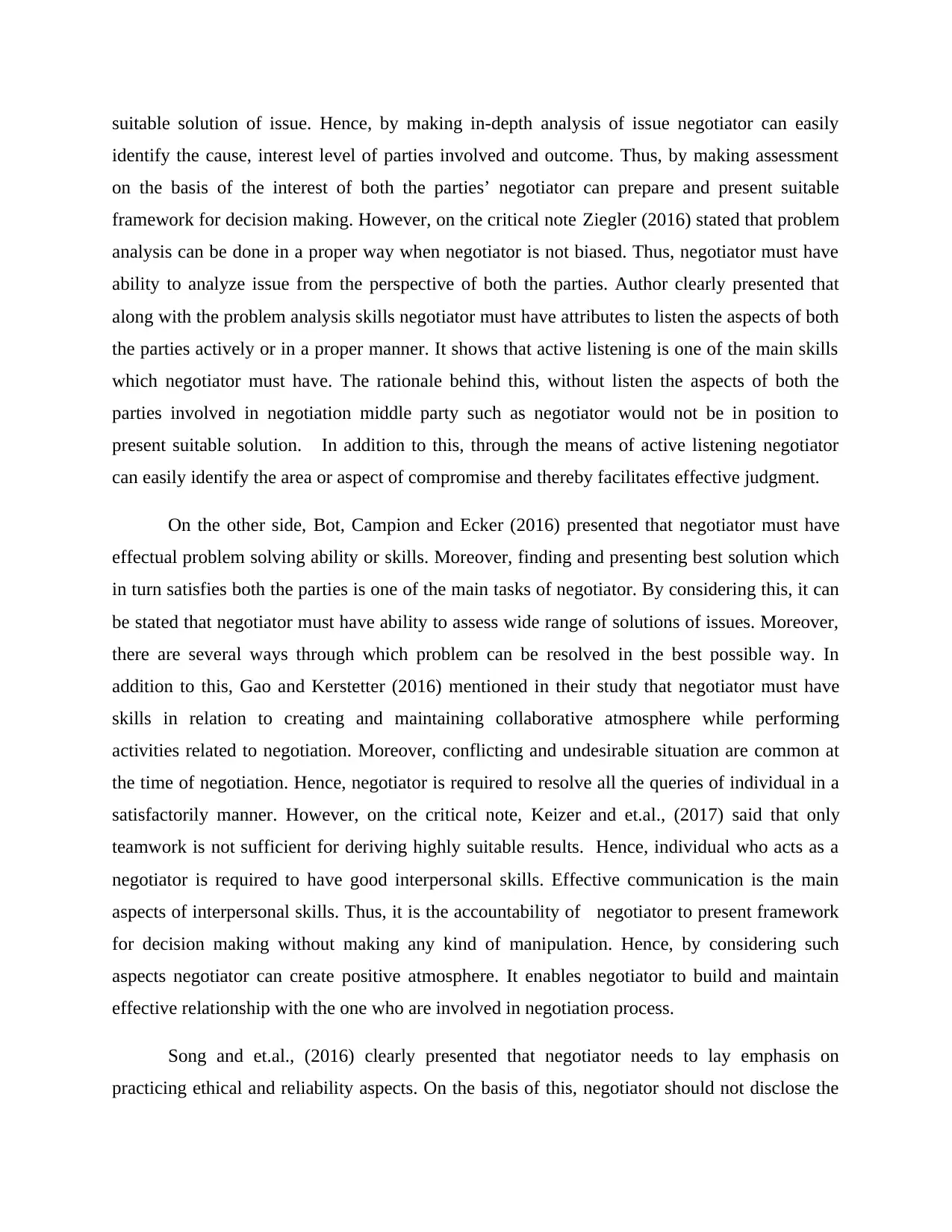
suitable solution of issue. Hence, by making in-depth analysis of issue negotiator can easily
identify the cause, interest level of parties involved and outcome. Thus, by making assessment
on the basis of the interest of both the parties’ negotiator can prepare and present suitable
framework for decision making. However, on the critical note Ziegler (2016) stated that problem
analysis can be done in a proper way when negotiator is not biased. Thus, negotiator must have
ability to analyze issue from the perspective of both the parties. Author clearly presented that
along with the problem analysis skills negotiator must have attributes to listen the aspects of both
the parties actively or in a proper manner. It shows that active listening is one of the main skills
which negotiator must have. The rationale behind this, without listen the aspects of both the
parties involved in negotiation middle party such as negotiator would not be in position to
present suitable solution. In addition to this, through the means of active listening negotiator
can easily identify the area or aspect of compromise and thereby facilitates effective judgment.
On the other side, Bot, Campion and Ecker (2016) presented that negotiator must have
effectual problem solving ability or skills. Moreover, finding and presenting best solution which
in turn satisfies both the parties is one of the main tasks of negotiator. By considering this, it can
be stated that negotiator must have ability to assess wide range of solutions of issues. Moreover,
there are several ways through which problem can be resolved in the best possible way. In
addition to this, Gao and Kerstetter (2016) mentioned in their study that negotiator must have
skills in relation to creating and maintaining collaborative atmosphere while performing
activities related to negotiation. Moreover, conflicting and undesirable situation are common at
the time of negotiation. Hence, negotiator is required to resolve all the queries of individual in a
satisfactorily manner. However, on the critical note, Keizer and et.al., (2017) said that only
teamwork is not sufficient for deriving highly suitable results. Hence, individual who acts as a
negotiator is required to have good interpersonal skills. Effective communication is the main
aspects of interpersonal skills. Thus, it is the accountability of negotiator to present framework
for decision making without making any kind of manipulation. Hence, by considering such
aspects negotiator can create positive atmosphere. It enables negotiator to build and maintain
effective relationship with the one who are involved in negotiation process.
Song and et.al., (2016) clearly presented that negotiator needs to lay emphasis on
practicing ethical and reliability aspects. On the basis of this, negotiator should not disclose the
identify the cause, interest level of parties involved and outcome. Thus, by making assessment
on the basis of the interest of both the parties’ negotiator can prepare and present suitable
framework for decision making. However, on the critical note Ziegler (2016) stated that problem
analysis can be done in a proper way when negotiator is not biased. Thus, negotiator must have
ability to analyze issue from the perspective of both the parties. Author clearly presented that
along with the problem analysis skills negotiator must have attributes to listen the aspects of both
the parties actively or in a proper manner. It shows that active listening is one of the main skills
which negotiator must have. The rationale behind this, without listen the aspects of both the
parties involved in negotiation middle party such as negotiator would not be in position to
present suitable solution. In addition to this, through the means of active listening negotiator
can easily identify the area or aspect of compromise and thereby facilitates effective judgment.
On the other side, Bot, Campion and Ecker (2016) presented that negotiator must have
effectual problem solving ability or skills. Moreover, finding and presenting best solution which
in turn satisfies both the parties is one of the main tasks of negotiator. By considering this, it can
be stated that negotiator must have ability to assess wide range of solutions of issues. Moreover,
there are several ways through which problem can be resolved in the best possible way. In
addition to this, Gao and Kerstetter (2016) mentioned in their study that negotiator must have
skills in relation to creating and maintaining collaborative atmosphere while performing
activities related to negotiation. Moreover, conflicting and undesirable situation are common at
the time of negotiation. Hence, negotiator is required to resolve all the queries of individual in a
satisfactorily manner. However, on the critical note, Keizer and et.al., (2017) said that only
teamwork is not sufficient for deriving highly suitable results. Hence, individual who acts as a
negotiator is required to have good interpersonal skills. Effective communication is the main
aspects of interpersonal skills. Thus, it is the accountability of negotiator to present framework
for decision making without making any kind of manipulation. Hence, by considering such
aspects negotiator can create positive atmosphere. It enables negotiator to build and maintain
effective relationship with the one who are involved in negotiation process.
Song and et.al., (2016) clearly presented that negotiator needs to lay emphasis on
practicing ethical and reliability aspects. On the basis of this, negotiator should not disclose the
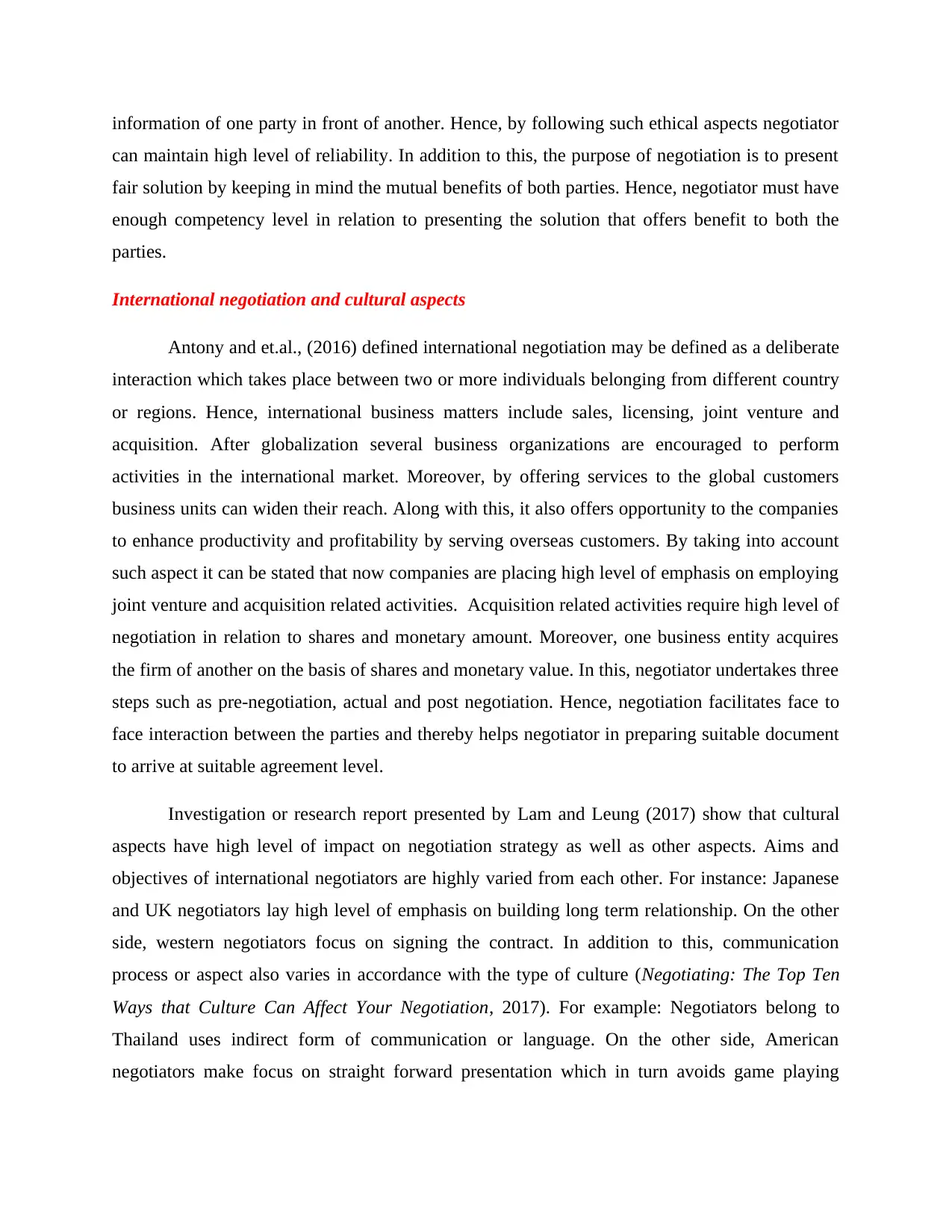
information of one party in front of another. Hence, by following such ethical aspects negotiator
can maintain high level of reliability. In addition to this, the purpose of negotiation is to present
fair solution by keeping in mind the mutual benefits of both parties. Hence, negotiator must have
enough competency level in relation to presenting the solution that offers benefit to both the
parties.
International negotiation and cultural aspects
Antony and et.al., (2016) defined international negotiation may be defined as a deliberate
interaction which takes place between two or more individuals belonging from different country
or regions. Hence, international business matters include sales, licensing, joint venture and
acquisition. After globalization several business organizations are encouraged to perform
activities in the international market. Moreover, by offering services to the global customers
business units can widen their reach. Along with this, it also offers opportunity to the companies
to enhance productivity and profitability by serving overseas customers. By taking into account
such aspect it can be stated that now companies are placing high level of emphasis on employing
joint venture and acquisition related activities. Acquisition related activities require high level of
negotiation in relation to shares and monetary amount. Moreover, one business entity acquires
the firm of another on the basis of shares and monetary value. In this, negotiator undertakes three
steps such as pre-negotiation, actual and post negotiation. Hence, negotiation facilitates face to
face interaction between the parties and thereby helps negotiator in preparing suitable document
to arrive at suitable agreement level.
Investigation or research report presented by Lam and Leung (2017) show that cultural
aspects have high level of impact on negotiation strategy as well as other aspects. Aims and
objectives of international negotiators are highly varied from each other. For instance: Japanese
and UK negotiators lay high level of emphasis on building long term relationship. On the other
side, western negotiators focus on signing the contract. In addition to this, communication
process or aspect also varies in accordance with the type of culture (Negotiating: The Top Ten
Ways that Culture Can Affect Your Negotiation, 2017). For example: Negotiators belong to
Thailand uses indirect form of communication or language. On the other side, American
negotiators make focus on straight forward presentation which in turn avoids game playing
can maintain high level of reliability. In addition to this, the purpose of negotiation is to present
fair solution by keeping in mind the mutual benefits of both parties. Hence, negotiator must have
enough competency level in relation to presenting the solution that offers benefit to both the
parties.
International negotiation and cultural aspects
Antony and et.al., (2016) defined international negotiation may be defined as a deliberate
interaction which takes place between two or more individuals belonging from different country
or regions. Hence, international business matters include sales, licensing, joint venture and
acquisition. After globalization several business organizations are encouraged to perform
activities in the international market. Moreover, by offering services to the global customers
business units can widen their reach. Along with this, it also offers opportunity to the companies
to enhance productivity and profitability by serving overseas customers. By taking into account
such aspect it can be stated that now companies are placing high level of emphasis on employing
joint venture and acquisition related activities. Acquisition related activities require high level of
negotiation in relation to shares and monetary amount. Moreover, one business entity acquires
the firm of another on the basis of shares and monetary value. In this, negotiator undertakes three
steps such as pre-negotiation, actual and post negotiation. Hence, negotiation facilitates face to
face interaction between the parties and thereby helps negotiator in preparing suitable document
to arrive at suitable agreement level.
Investigation or research report presented by Lam and Leung (2017) show that cultural
aspects have high level of impact on negotiation strategy as well as other aspects. Aims and
objectives of international negotiators are highly varied from each other. For instance: Japanese
and UK negotiators lay high level of emphasis on building long term relationship. On the other
side, western negotiators focus on signing the contract. In addition to this, communication
process or aspect also varies in accordance with the type of culture (Negotiating: The Top Ten
Ways that Culture Can Affect Your Negotiation, 2017). For example: Negotiators belong to
Thailand uses indirect form of communication or language. On the other side, American
negotiators make focus on straight forward presentation which in turn avoids game playing
⊘ This is a preview!⊘
Do you want full access?
Subscribe today to unlock all pages.

Trusted by 1+ million students worldwide
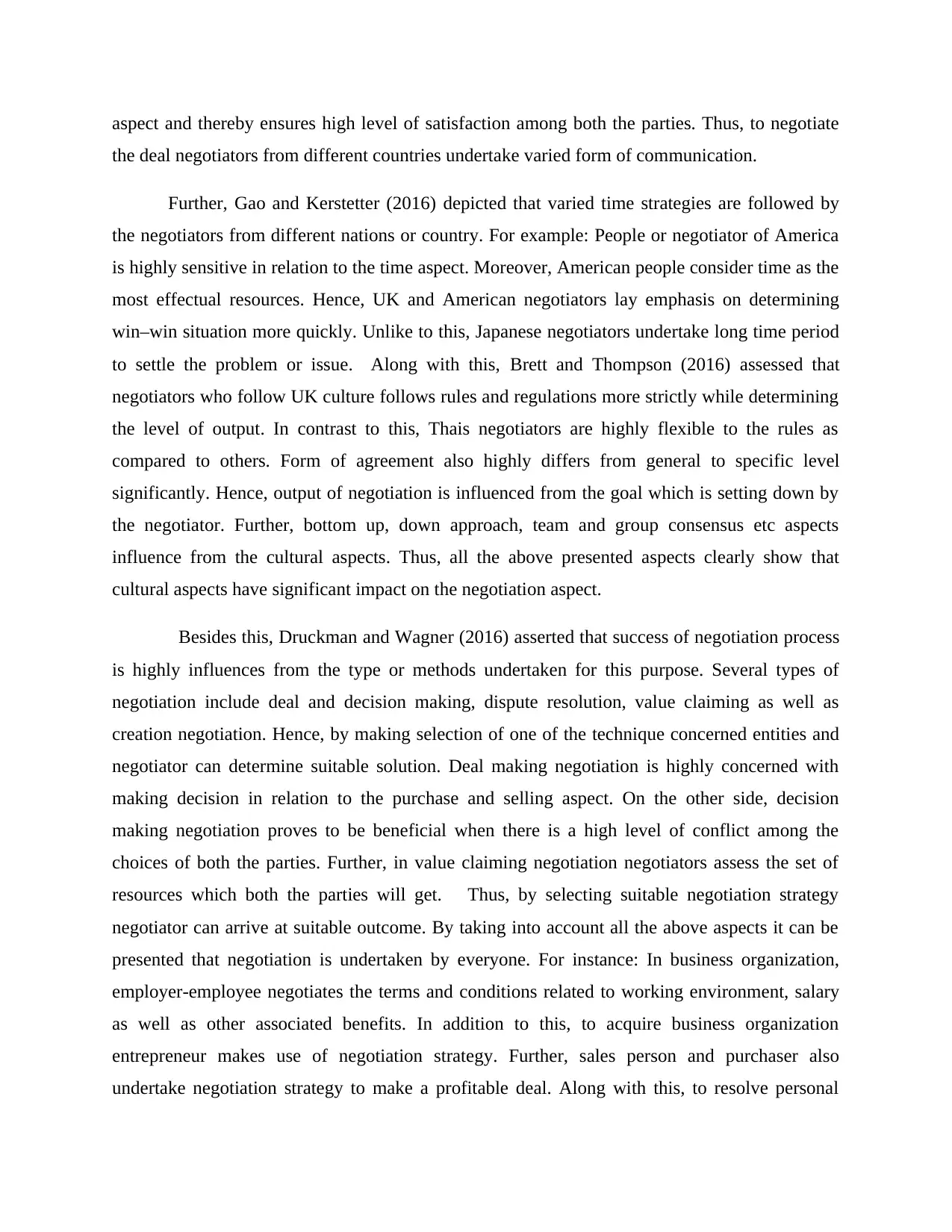
aspect and thereby ensures high level of satisfaction among both the parties. Thus, to negotiate
the deal negotiators from different countries undertake varied form of communication.
Further, Gao and Kerstetter (2016) depicted that varied time strategies are followed by
the negotiators from different nations or country. For example: People or negotiator of America
is highly sensitive in relation to the time aspect. Moreover, American people consider time as the
most effectual resources. Hence, UK and American negotiators lay emphasis on determining
win–win situation more quickly. Unlike to this, Japanese negotiators undertake long time period
to settle the problem or issue. Along with this, Brett and Thompson (2016) assessed that
negotiators who follow UK culture follows rules and regulations more strictly while determining
the level of output. In contrast to this, Thais negotiators are highly flexible to the rules as
compared to others. Form of agreement also highly differs from general to specific level
significantly. Hence, output of negotiation is influenced from the goal which is setting down by
the negotiator. Further, bottom up, down approach, team and group consensus etc aspects
influence from the cultural aspects. Thus, all the above presented aspects clearly show that
cultural aspects have significant impact on the negotiation aspect.
Besides this, Druckman and Wagner (2016) asserted that success of negotiation process
is highly influences from the type or methods undertaken for this purpose. Several types of
negotiation include deal and decision making, dispute resolution, value claiming as well as
creation negotiation. Hence, by making selection of one of the technique concerned entities and
negotiator can determine suitable solution. Deal making negotiation is highly concerned with
making decision in relation to the purchase and selling aspect. On the other side, decision
making negotiation proves to be beneficial when there is a high level of conflict among the
choices of both the parties. Further, in value claiming negotiation negotiators assess the set of
resources which both the parties will get. Thus, by selecting suitable negotiation strategy
negotiator can arrive at suitable outcome. By taking into account all the above aspects it can be
presented that negotiation is undertaken by everyone. For instance: In business organization,
employer-employee negotiates the terms and conditions related to working environment, salary
as well as other associated benefits. In addition to this, to acquire business organization
entrepreneur makes use of negotiation strategy. Further, sales person and purchaser also
undertake negotiation strategy to make a profitable deal. Along with this, to resolve personal
the deal negotiators from different countries undertake varied form of communication.
Further, Gao and Kerstetter (2016) depicted that varied time strategies are followed by
the negotiators from different nations or country. For example: People or negotiator of America
is highly sensitive in relation to the time aspect. Moreover, American people consider time as the
most effectual resources. Hence, UK and American negotiators lay emphasis on determining
win–win situation more quickly. Unlike to this, Japanese negotiators undertake long time period
to settle the problem or issue. Along with this, Brett and Thompson (2016) assessed that
negotiators who follow UK culture follows rules and regulations more strictly while determining
the level of output. In contrast to this, Thais negotiators are highly flexible to the rules as
compared to others. Form of agreement also highly differs from general to specific level
significantly. Hence, output of negotiation is influenced from the goal which is setting down by
the negotiator. Further, bottom up, down approach, team and group consensus etc aspects
influence from the cultural aspects. Thus, all the above presented aspects clearly show that
cultural aspects have significant impact on the negotiation aspect.
Besides this, Druckman and Wagner (2016) asserted that success of negotiation process
is highly influences from the type or methods undertaken for this purpose. Several types of
negotiation include deal and decision making, dispute resolution, value claiming as well as
creation negotiation. Hence, by making selection of one of the technique concerned entities and
negotiator can determine suitable solution. Deal making negotiation is highly concerned with
making decision in relation to the purchase and selling aspect. On the other side, decision
making negotiation proves to be beneficial when there is a high level of conflict among the
choices of both the parties. Further, in value claiming negotiation negotiators assess the set of
resources which both the parties will get. Thus, by selecting suitable negotiation strategy
negotiator can arrive at suitable outcome. By taking into account all the above aspects it can be
presented that negotiation is undertaken by everyone. For instance: In business organization,
employer-employee negotiates the terms and conditions related to working environment, salary
as well as other associated benefits. In addition to this, to acquire business organization
entrepreneur makes use of negotiation strategy. Further, sales person and purchaser also
undertake negotiation strategy to make a profitable deal. Along with this, to resolve personal
Paraphrase This Document
Need a fresh take? Get an instant paraphrase of this document with our AI Paraphraser
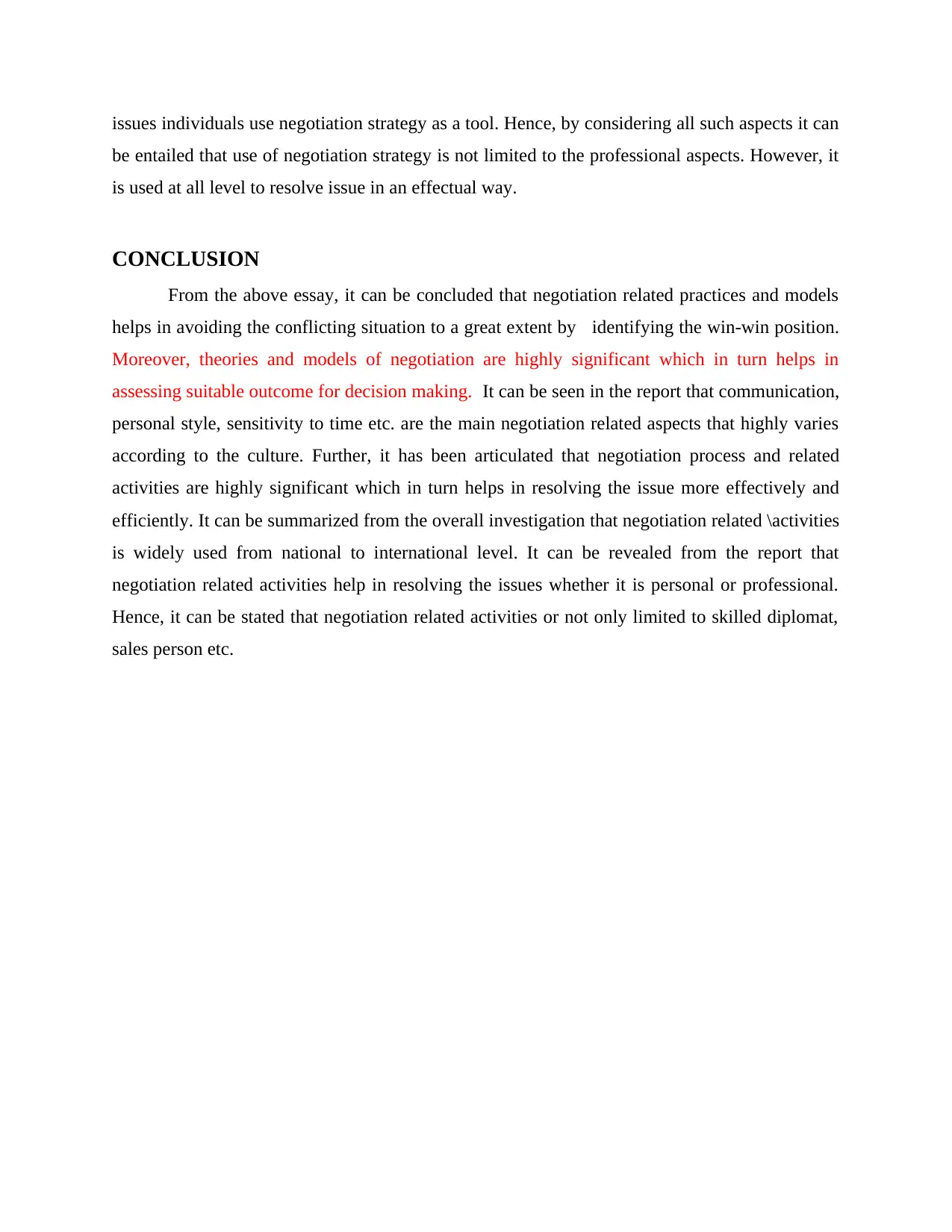
issues individuals use negotiation strategy as a tool. Hence, by considering all such aspects it can
be entailed that use of negotiation strategy is not limited to the professional aspects. However, it
is used at all level to resolve issue in an effectual way.
CONCLUSION
From the above essay, it can be concluded that negotiation related practices and models
helps in avoiding the conflicting situation to a great extent by identifying the win-win position.
Moreover, theories and models of negotiation are highly significant which in turn helps in
assessing suitable outcome for decision making. It can be seen in the report that communication,
personal style, sensitivity to time etc. are the main negotiation related aspects that highly varies
according to the culture. Further, it has been articulated that negotiation process and related
activities are highly significant which in turn helps in resolving the issue more effectively and
efficiently. It can be summarized from the overall investigation that negotiation related \activities
is widely used from national to international level. It can be revealed from the report that
negotiation related activities help in resolving the issues whether it is personal or professional.
Hence, it can be stated that negotiation related activities or not only limited to skilled diplomat,
sales person etc.
be entailed that use of negotiation strategy is not limited to the professional aspects. However, it
is used at all level to resolve issue in an effectual way.
CONCLUSION
From the above essay, it can be concluded that negotiation related practices and models
helps in avoiding the conflicting situation to a great extent by identifying the win-win position.
Moreover, theories and models of negotiation are highly significant which in turn helps in
assessing suitable outcome for decision making. It can be seen in the report that communication,
personal style, sensitivity to time etc. are the main negotiation related aspects that highly varies
according to the culture. Further, it has been articulated that negotiation process and related
activities are highly significant which in turn helps in resolving the issue more effectively and
efficiently. It can be summarized from the overall investigation that negotiation related \activities
is widely used from national to international level. It can be revealed from the report that
negotiation related activities help in resolving the issues whether it is personal or professional.
Hence, it can be stated that negotiation related activities or not only limited to skilled diplomat,
sales person etc.
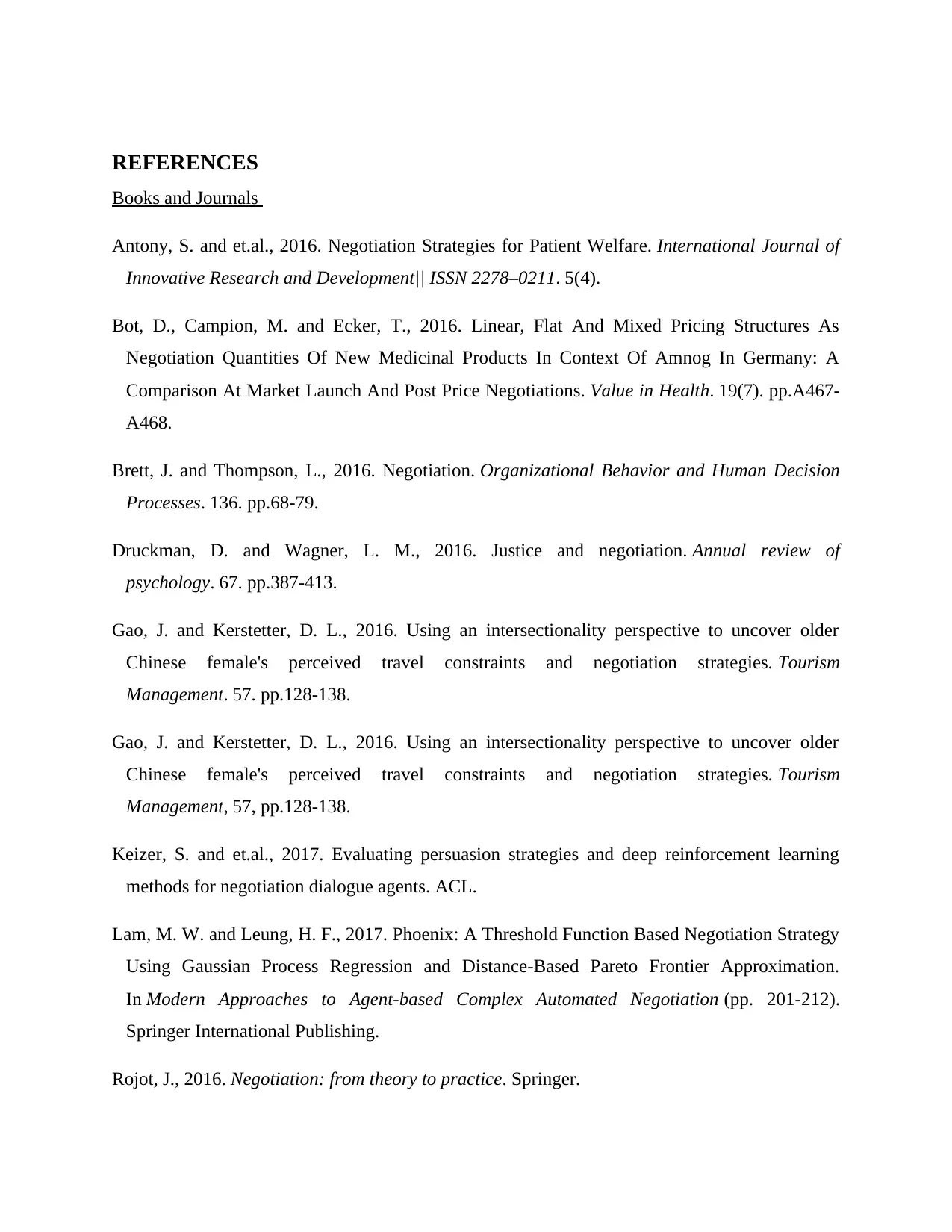
REFERENCES
Books and Journals
Antony, S. and et.al., 2016. Negotiation Strategies for Patient Welfare. International Journal of
Innovative Research and Development|| ISSN 2278–0211. 5(4).
Bot, D., Campion, M. and Ecker, T., 2016. Linear, Flat And Mixed Pricing Structures As
Negotiation Quantities Of New Medicinal Products In Context Of Amnog In Germany: A
Comparison At Market Launch And Post Price Negotiations. Value in Health. 19(7). pp.A467-
A468.
Brett, J. and Thompson, L., 2016. Negotiation. Organizational Behavior and Human Decision
Processes. 136. pp.68-79.
Druckman, D. and Wagner, L. M., 2016. Justice and negotiation. Annual review of
psychology. 67. pp.387-413.
Gao, J. and Kerstetter, D. L., 2016. Using an intersectionality perspective to uncover older
Chinese female's perceived travel constraints and negotiation strategies. Tourism
Management. 57. pp.128-138.
Gao, J. and Kerstetter, D. L., 2016. Using an intersectionality perspective to uncover older
Chinese female's perceived travel constraints and negotiation strategies. Tourism
Management, 57, pp.128-138.
Keizer, S. and et.al., 2017. Evaluating persuasion strategies and deep reinforcement learning
methods for negotiation dialogue agents. ACL.
Lam, M. W. and Leung, H. F., 2017. Phoenix: A Threshold Function Based Negotiation Strategy
Using Gaussian Process Regression and Distance-Based Pareto Frontier Approximation.
In Modern Approaches to Agent-based Complex Automated Negotiation (pp. 201-212).
Springer International Publishing.
Rojot, J., 2016. Negotiation: from theory to practice. Springer.
Books and Journals
Antony, S. and et.al., 2016. Negotiation Strategies for Patient Welfare. International Journal of
Innovative Research and Development|| ISSN 2278–0211. 5(4).
Bot, D., Campion, M. and Ecker, T., 2016. Linear, Flat And Mixed Pricing Structures As
Negotiation Quantities Of New Medicinal Products In Context Of Amnog In Germany: A
Comparison At Market Launch And Post Price Negotiations. Value in Health. 19(7). pp.A467-
A468.
Brett, J. and Thompson, L., 2016. Negotiation. Organizational Behavior and Human Decision
Processes. 136. pp.68-79.
Druckman, D. and Wagner, L. M., 2016. Justice and negotiation. Annual review of
psychology. 67. pp.387-413.
Gao, J. and Kerstetter, D. L., 2016. Using an intersectionality perspective to uncover older
Chinese female's perceived travel constraints and negotiation strategies. Tourism
Management. 57. pp.128-138.
Gao, J. and Kerstetter, D. L., 2016. Using an intersectionality perspective to uncover older
Chinese female's perceived travel constraints and negotiation strategies. Tourism
Management, 57, pp.128-138.
Keizer, S. and et.al., 2017. Evaluating persuasion strategies and deep reinforcement learning
methods for negotiation dialogue agents. ACL.
Lam, M. W. and Leung, H. F., 2017. Phoenix: A Threshold Function Based Negotiation Strategy
Using Gaussian Process Regression and Distance-Based Pareto Frontier Approximation.
In Modern Approaches to Agent-based Complex Automated Negotiation (pp. 201-212).
Springer International Publishing.
Rojot, J., 2016. Negotiation: from theory to practice. Springer.
⊘ This is a preview!⊘
Do you want full access?
Subscribe today to unlock all pages.

Trusted by 1+ million students worldwide
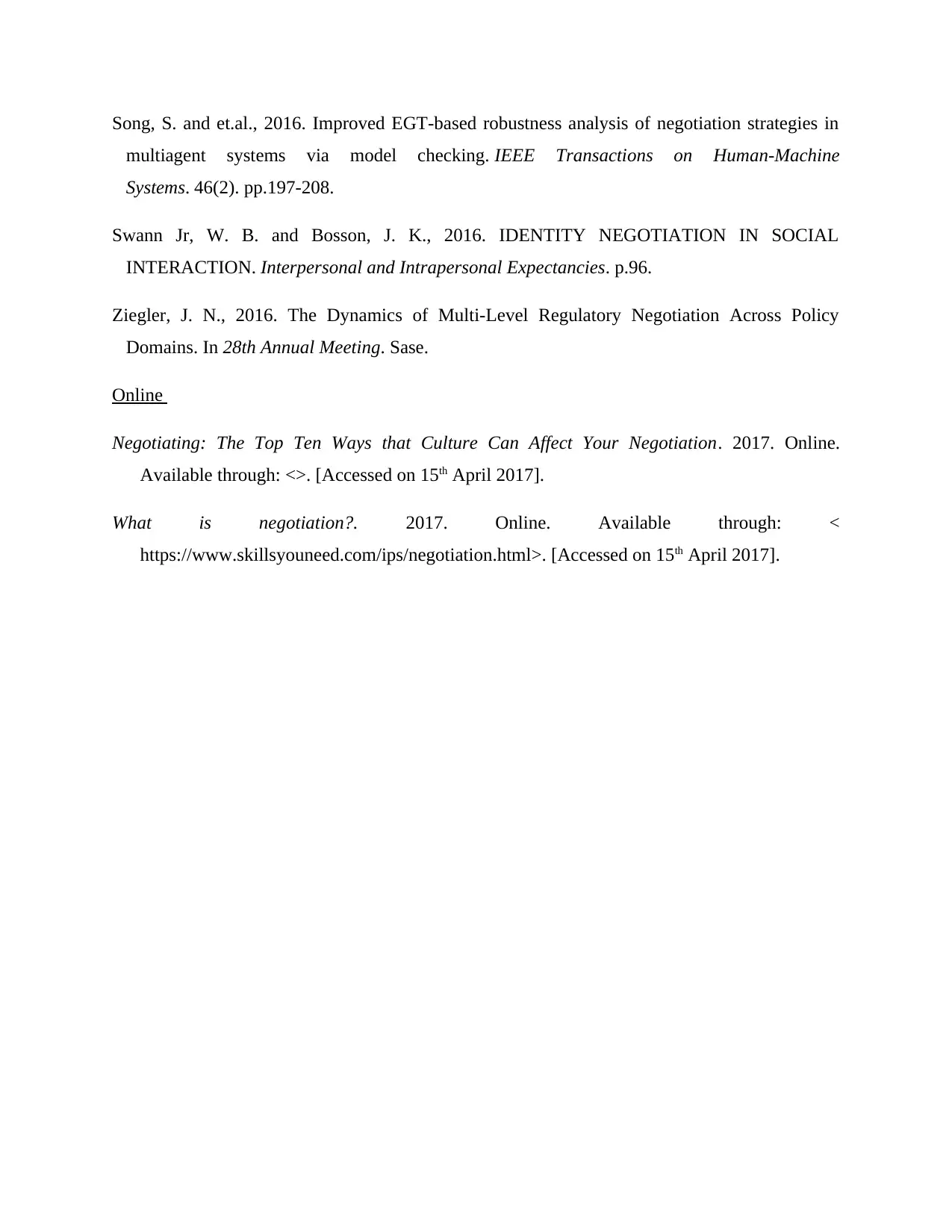
Song, S. and et.al., 2016. Improved EGT-based robustness analysis of negotiation strategies in
multiagent systems via model checking. IEEE Transactions on Human-Machine
Systems. 46(2). pp.197-208.
Swann Jr, W. B. and Bosson, J. K., 2016. IDENTITY NEGOTIATION IN SOCIAL
INTERACTION. Interpersonal and Intrapersonal Expectancies. p.96.
Ziegler, J. N., 2016. The Dynamics of Multi-Level Regulatory Negotiation Across Policy
Domains. In 28th Annual Meeting. Sase.
Online
Negotiating: The Top Ten Ways that Culture Can Affect Your Negotiation. 2017. Online.
Available through: <>. [Accessed on 15th April 2017].
What is negotiation?. 2017. Online. Available through: <
https://www.skillsyouneed.com/ips/negotiation.html>. [Accessed on 15th April 2017].
multiagent systems via model checking. IEEE Transactions on Human-Machine
Systems. 46(2). pp.197-208.
Swann Jr, W. B. and Bosson, J. K., 2016. IDENTITY NEGOTIATION IN SOCIAL
INTERACTION. Interpersonal and Intrapersonal Expectancies. p.96.
Ziegler, J. N., 2016. The Dynamics of Multi-Level Regulatory Negotiation Across Policy
Domains. In 28th Annual Meeting. Sase.
Online
Negotiating: The Top Ten Ways that Culture Can Affect Your Negotiation. 2017. Online.
Available through: <>. [Accessed on 15th April 2017].
What is negotiation?. 2017. Online. Available through: <
https://www.skillsyouneed.com/ips/negotiation.html>. [Accessed on 15th April 2017].
1 out of 10
Related Documents
Your All-in-One AI-Powered Toolkit for Academic Success.
+13062052269
info@desklib.com
Available 24*7 on WhatsApp / Email
![[object Object]](/_next/static/media/star-bottom.7253800d.svg)
Unlock your academic potential
Copyright © 2020–2026 A2Z Services. All Rights Reserved. Developed and managed by ZUCOL.



